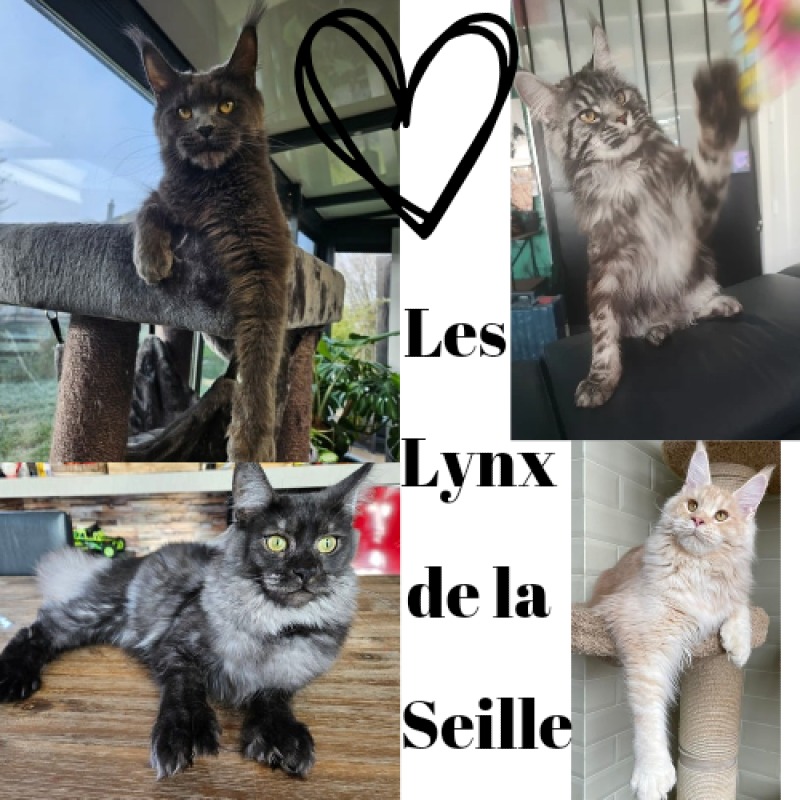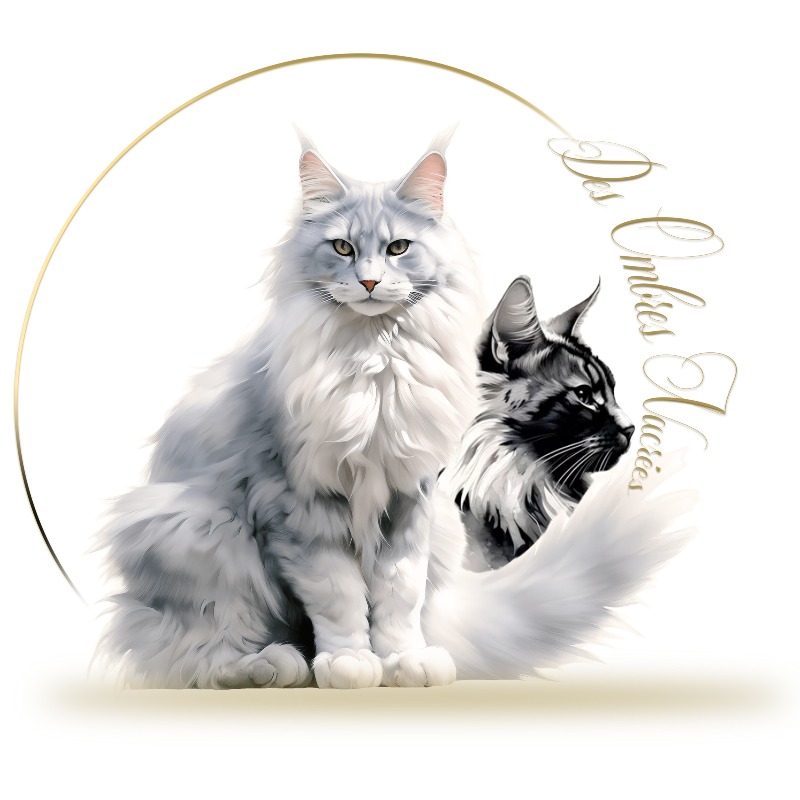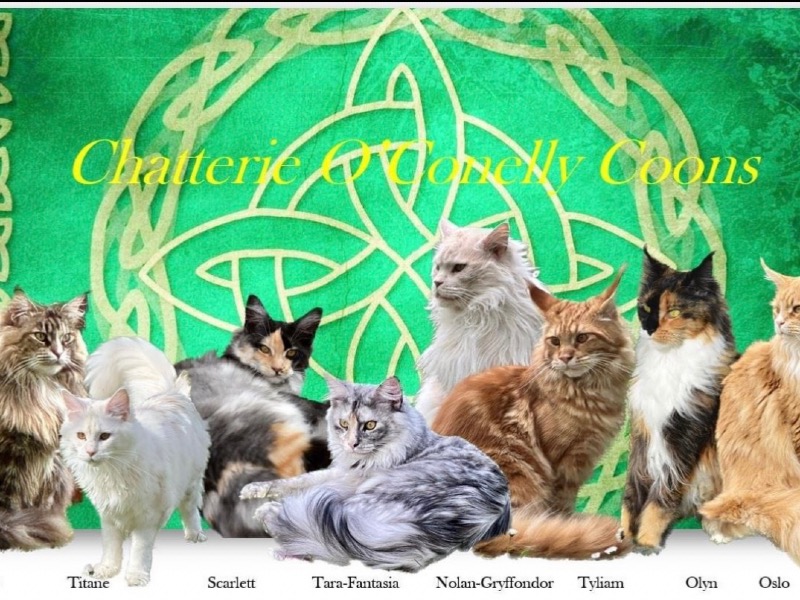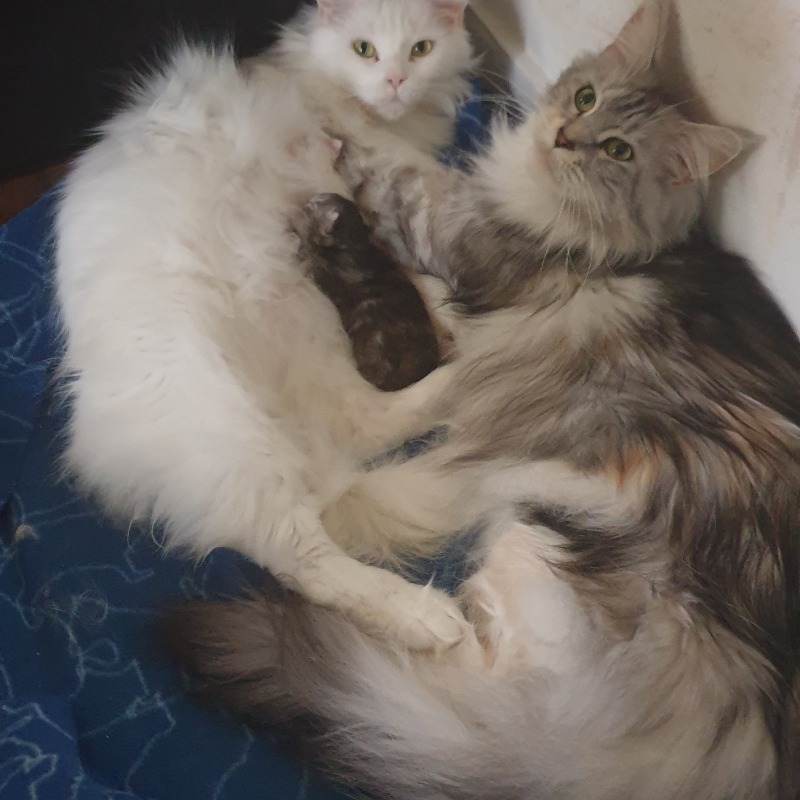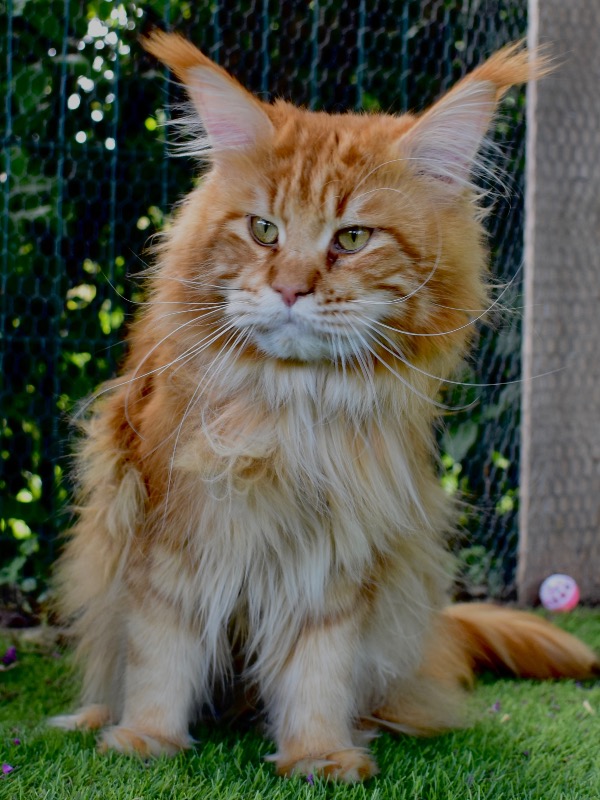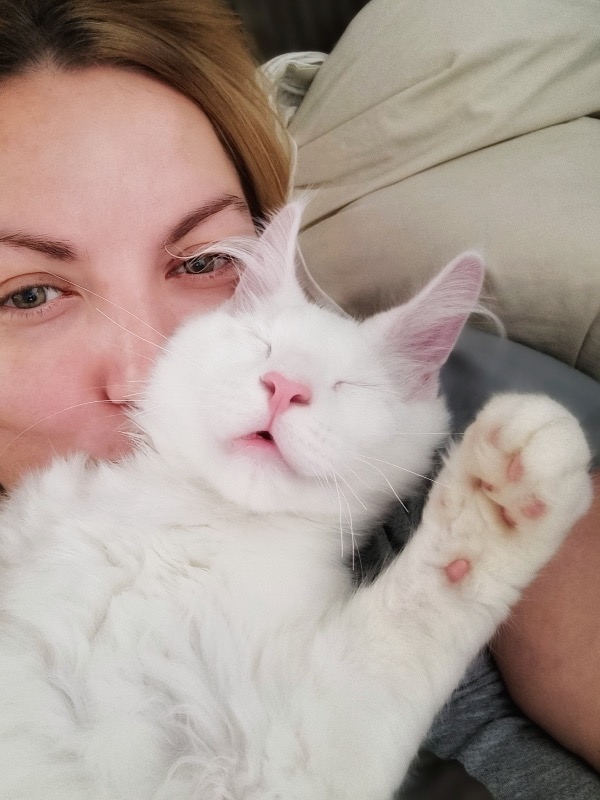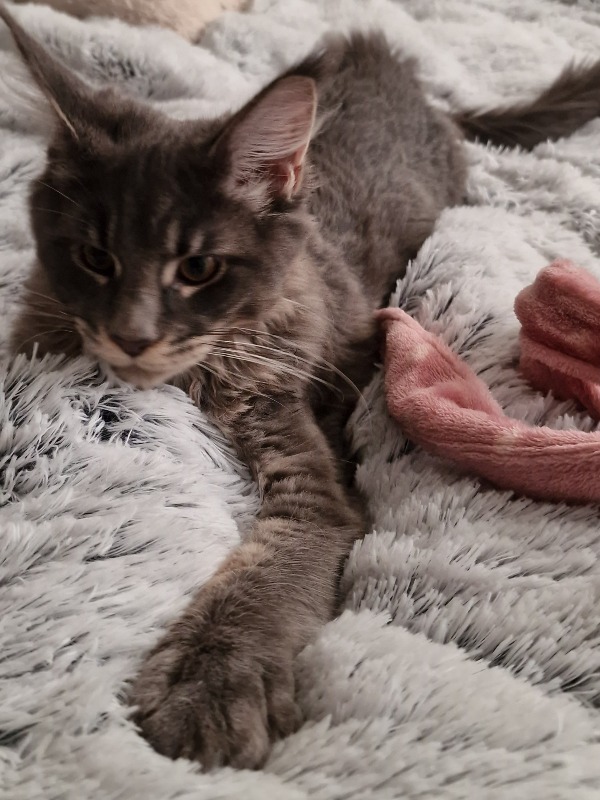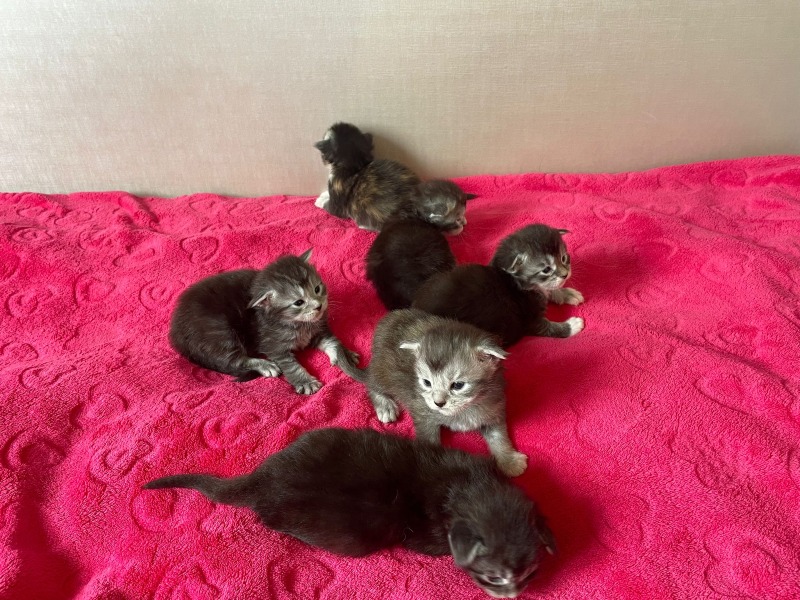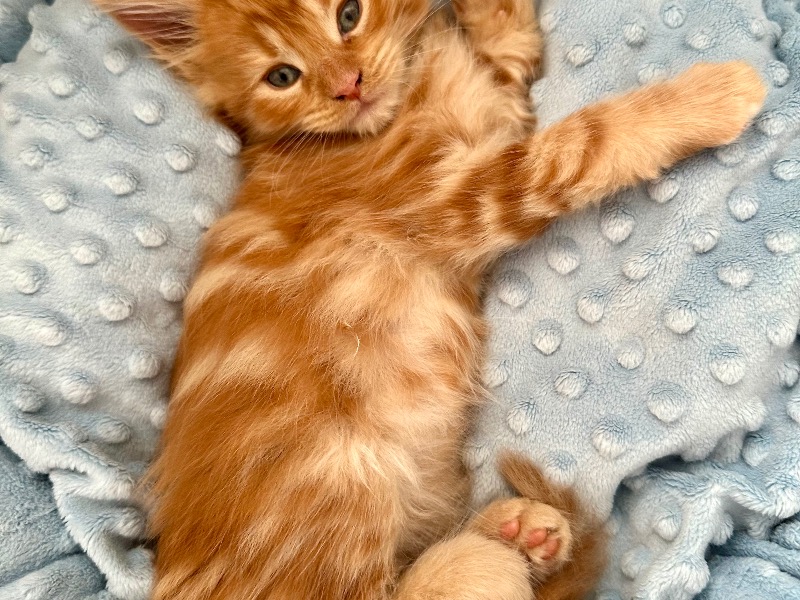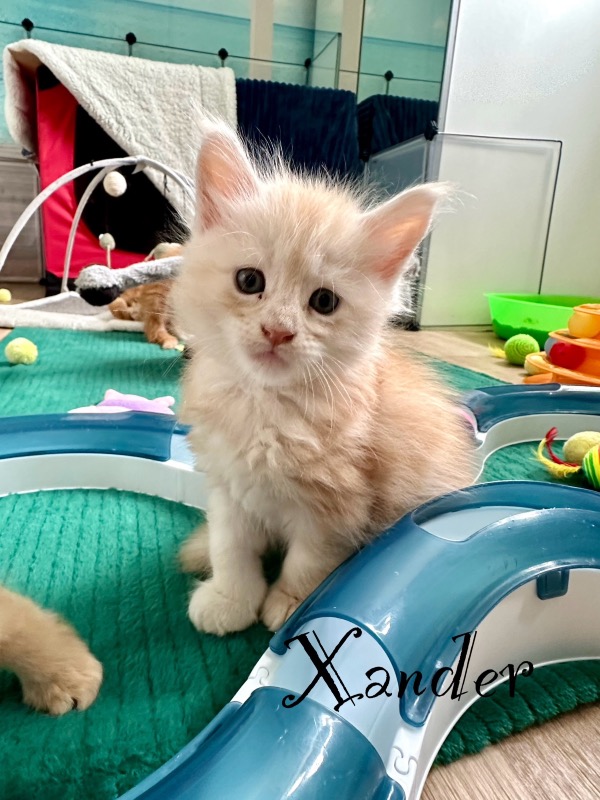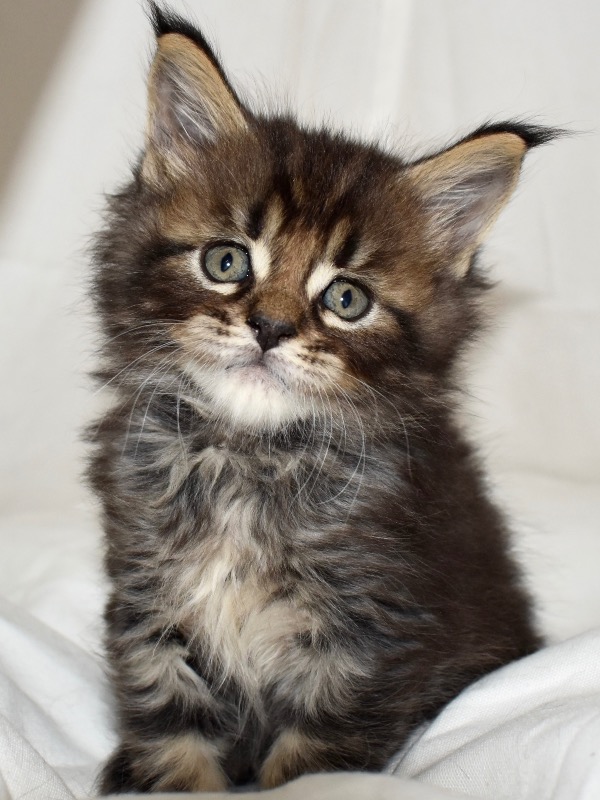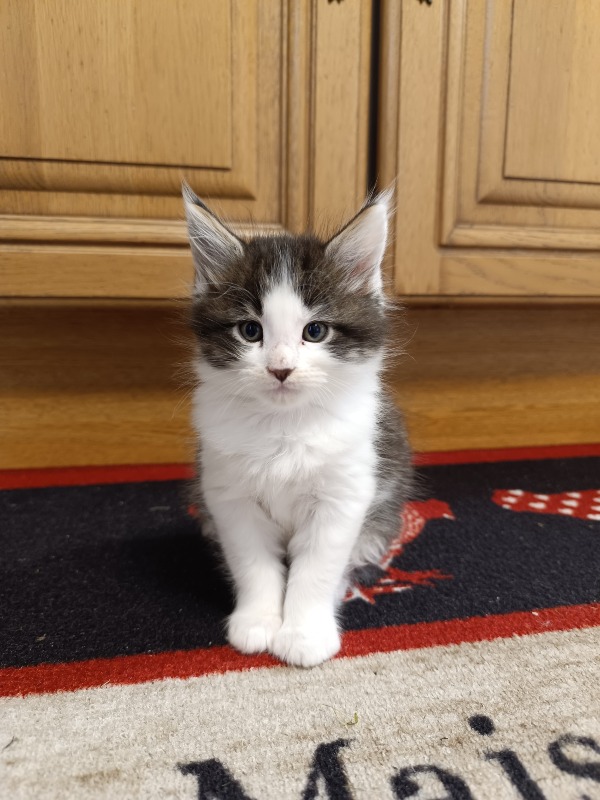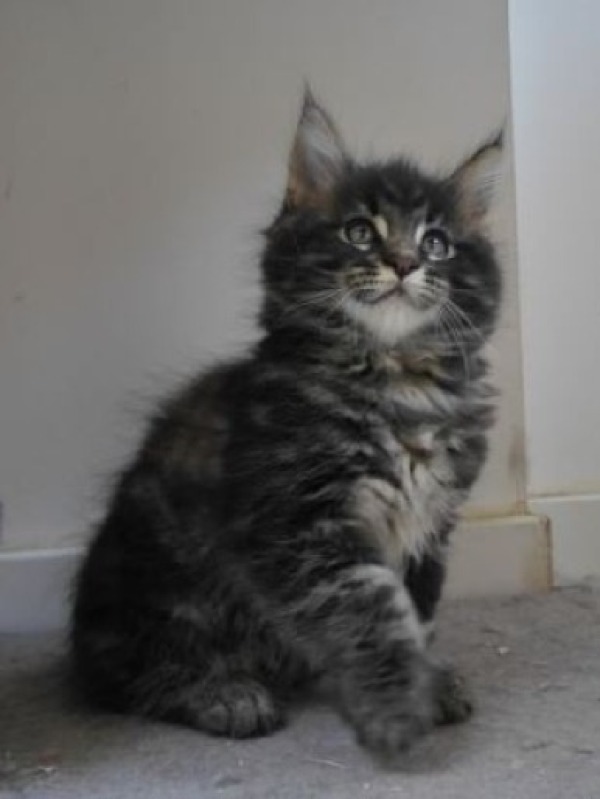Maine coon
Welcome to our page dedicated to the breed of cat maine coon!
Here, you will find all the useful information about maine coon. This descriptive profile will allow you to discover the aspects of this breed. You can notably consult information about the average price, monthly and annual upkeep expenses, their health, name ideas, as well as their official recognition by competent authorities.
Explore this page to discover everything you need to know.
Overall description of the breed
The Maine Coon cat, with its imposing size, loving personality, and beautiful coat, is one of the most popular and cherished cat breeds worldwide. Its fascinating history dates back to the United States and is woven with legends and intriguing stories.
Its history is rich in folklore and mystery. It is often said that this breed originated from the crossbreeding of American domestic cats and long-haired cats brought to the United States by sailors in the 19th century. A popular legend suggests that the first Maine Coons were descendants of long-haired French cats owned by Queen Marie Antoinette, which ended up on the shores of Maine after her attempted escape during the French Revolution. However, despite these colorful tales, the exact origin of the Maine Coon remains uncertain.
The ancestor of the Maine Coon could actually be a local short-haired cat from the Maine region in the United States, which evolved to develop its thick fur and large size to survive in the harsh winter conditions of the area. Regardless of its exact origin, the Maine Coon quickly established itself as a distinct and cherished cat breed.
Its morphology is impressive. With its muscular body and long bushy tail, it can weigh on average between 5.5 kg and 9 kg (12 lbs to 20 lbs) for males and between 4 kg and 6.5 kg (9 lbs to 14 lbs) for females. Its size is also remarkable, with an average height of 25 cm to 40 cm (10 inches to 16 inches) at the withers and a length of up to 101 cm (40 inches) from the tip of the nose to the tail end.
The coat of the Maine Coon is one of its most iconic features. There is a wide variety of colors and patterns, ranging from classic tabby to solid, bicolor, and tricolor variations. The character of the Maine Coon is equally captivating. Known for its gentle, social, and friendly personality, the Maine Coon is often described as a "gentle giant." It generally gets along well with children, other pets, and strangers, making it an excellent family companion.
As for breed clubs, the Maine Coon has gained worldwide recognition. The first breed club, the "Central Maine Coon Cat Club," was established in 1950, followed by the "Maine Coon Breeders and Fanciers Association" (MCBFA), founded in 1968 in the United States to promote and protect this iconic breed. The breed standard was established over the years and is now widely recognized and adopted by international cat organizations, including the Cat Fanciers' Association (CFA) in 1970, a major feline club overseas, and the Fédération Internationale Féline (FIFe) a few years later in 1983.
The Maine Coon is now one of the most beloved and recognized cat breeds worldwide. Its intriguing history, impressive morphology, beautiful coat, and friendly character have captured the hearts of many cat lovers across generations. It continues to reign as one of the most loved and sought-after cats, while keeping alive the mystery of its origins and the charm of its unique personality.
Awareness of acquiring an animal
Each animal is a sensitive being, deserving love, attention and care.
When you choose to adopt an animal, you take on the responsibility of ensuring its health and well-being throughout its life.
To learn more about animal welfare, we invite you to consult our FAQ by clicking the button below:
Origins
The Maine Coon is a breed of cat originating from the United States, specifically from the state of Maine. It is often considered as the first American breed of cat. Legend has it that it comes from the union between domestic cats and raccoons, hence its name "Coon". However, this hypothesis is biologically impossible. It is more likely that the Maine Coon descends from cats brought by European and Nordic sailors, including Angora-type cats and Norwegian forest cats. These cats have adapted to the harsh climatic conditions of Maine, developing a thick coat and a robust constitution. The Maine Coon is now appreciated for its imposing size and gentle character.
History
The history of the Maine Coon is rich in folklore and mystery. This breed appeared in the early 19th century in the state of Maine, in the United States, where it quickly gained popularity for its exceptional hunting skills and its ability to survive in harsh weather conditions. Farmers and sailors greatly appreciated these sturdy and independent cats. The breed was officially recognized at the end of the 19th century, but it almost disappeared in the early 20th century with the arrival of more popular exotic breeds. Thanks to the efforts of breeders and enthusiasts, the Maine Coon experienced a revival in the 1950s and is now one of the most popular cat breeds in the world.
Standard
The standard of the Maine Coon breed, as defined by the main feline associations, describes a large, robust and well-proportioned cat. The head is of medium size, with a square muzzle and high cheekbones. The ears are large, wide at the base and pointed, often adorned with lynx tufts. The eyes are large, oval, and can be of various colors, often in harmony with the coat. The body is muscular, with a broad chest and strong bones. The tail is long and fluffy, often as long as the cat's body. The coat is medium to long, dense and silky, with a pronounced ruff around the neck and an waterproof undercoat. Accepted colors and patterns are very varied, including brown, black, blue, red, cream, and many others.
Physical characteristics
The Maine Coon is one of the largest domestic cat breeds. Males can weigh between 6 and 8 kg, and females between 4 and 6 kg, although some individuals can exceed these weights. They generally measure between 25 and 40 cm in height, not counting the tail which can add an additional 30 to 40 cm to their total length. Their coat is medium to long, dense and silky, suitable for cold climates. They have a ruff around their neck, shorter fur on the shoulders, and longer fur on the back and sides. The coat colors are extremely varied, including all shades of black, blue, red, cream, with or without tabby patterns, bicolor, tricolor, and many others. Their eyes are large, oval, and can be green, golden, copper, or blue.
Character
The Maine Coon is known for its gentle, affectionate and sociable nature. This cat is very attached to its human family and enjoys participating in household activities, often following its owners from one room to another. Despite its large size, it is generally very kind and tolerant, making it an excellent companion for children and other animals. The Maine Coon is also known for its playful and curious nature, enjoying playing with interactive toys and climbing on cat trees. It is intelligent and easy to train, responding well to commands and learning games. Although sociable, it maintains a certain level of independence and can spend time alone without any issues.
Life expectancy
The Maine Coon has a relatively long life expectancy for a large breed cat, generally ranging between 12 and 15 years. This longevity depends on several factors, including a balanced diet, regular veterinary care, and a healthy living environment. Owners should be attentive to health issues specific to the breed, such as hypertrophic cardiomyopathy (a heart disease), hip dysplasia, and certain hereditary diseases. Regular veterinary check-ups can help detect and treat any health condition quickly, contributing to a long and healthy life for the Maine Coon. With proper care and special attention to their well-being, these sturdy cats can be loyal companions for many years.
Exercise and activity needs
The Maine Coon, despite its imposing size, is a very active and playful cat. It needs a lot of physical and mental stimulation to stay healthy and happy. Regular play sessions with interactive toys, feathers, balls or cat puzzles are essential. Cat trees and scratching posts are also important for climbing, perching and scratching. Due to their intelligence and natural curiosity, Maine Coons enjoy learning games and activities that challenge their minds. Although they are independent, they like to spend time with their owners, whether it is playing or simply relaxing together.
Recommended diet
The Maine Coon's diet must be balanced and tailored to its specific needs, given its large size and activity level. High-quality food, rich in proteins and essential nutrients, is recommended. Premium dry cat food for large breeds or wet food are good options. An adult Maine Coon consumes an average of 200 to 300 grams of food per day, divided into two meals. The monthly cost of food can vary between 40 and 80 euros, depending on the quality of the products chosen. It is crucial to monitor its weight and avoid overeating, as obesity can lead to various health problems. Nutritional supplements may be considered to support joint and heart health.
Training and obedience
The Maine Coon is an intelligent and receptive cat, which makes its education and training relatively easy. It can learn various tricks and basic commands, such as "sit", "come" or "shake hands". Using positive reinforcement methods, such as treats and praise, is particularly effective with this breed. The Maine Coon loves to play and can be trained to use interactive toys and puzzles for cats. It is also possible to teach him to walk on a leash, which can be a rewarding activity for him and his owner. Early socialization is crucial for him to get used to different people, environments, and other animals, ensuring balanced and confident behavior.
Behavior with children
The Maine Coon is often considered an excellent companion for children because of its gentle, patient, and affectionate nature. It is generally very tolerant and enjoys interacting with young children, readily participating in their games. Its playful and sociable nature makes it an ideal playmate. However, due to its imposing size, it is important to teach children to handle the cat with respect and gentleness to avoid any incidents. The Maine Coon has a stable temperament and is rarely aggressive, making it particularly well-suited to family life. With proper socialization and appropriate supervision, it can become a loyal and loving companion for children of all ages.
Compatibility with Other Animals
The Maine Coon is generally very sociable and gets along well with other pets, including dogs and cats. Its gentle and tolerant nature allows it to coexist harmoniously with different types of animals. It is important to proceed with gradual and controlled introductions to ensure successful cohabitation. Maine Coons, thanks to their intelligence and curiosity, quickly adapt to new companions and can even become friends with them. They are not particularly territorial, which makes living in community with other animals easier. Early and positive socialization is crucial to encourage harmonious interactions and minimize the risks of conflicts.
Grooming needs
The Maine Coon, with its long and thick fur, requires regular maintenance to avoid knots and tangles. Weekly brushing is recommended to maintain the beauty and health of its coat. During shedding periods, in the spring and fall, brushing should be intensified to manage excess hair. Baths are only necessary occasionally, or when the cat is particularly dirty, using a gentle shampoo suitable for cats. Ears should be checked and cleaned regularly to prevent infections, and teeth should be brushed frequently to avoid dental problems. Claws should be trimmed regularly to prevent injuries and snags.
Health
The Maine Coon is a robust breed, but it is prone to certain genetic and hereditary conditions. Common health problems include hypertrophic cardiomyopathy (a heart disease), hip dysplasia, and kidney polykystosis. It is essential to choose a reputable breeder who tests their cats for these conditions to minimize risks. A balanced diet, regular exercise, and periodic veterinary visits are crucial for maintaining their health. Owners should be attentive to any signs of discomfort and regularly consult a veterinarian for health check-ups. With proper care, the Maine Coon can live a long and healthy life, with an average life expectancy of 12 to 15 years.
Average price
The price of a Maine Coon can vary considerably depending on several factors, such as lineage, pedigree, breeder reputation, and geographic location. In general, the average price for a Maine Coon kitten ranges between 800 and 1,500 euros. Specimens from champion lines or with exceptional characteristics can cost much more, sometimes up to 2,500 euros or more. It is essential to choose a reputable breeder who adheres to health and animal welfare standards. Although this may mean paying a higher price, it often ensures a healthy and well-socialized kitten. Future owners should also budget for additional expenses for veterinary care, food, accessories, and training.
Expenses
Monthly expenses for a Maine Coon can vary depending on several factors, including food, veterinary care, grooming, and accessories. On average, owners can expect to spend between 50 and 100 euros per month. High quality food, tailored to the breed's specific needs, costs around 30 to 60 euros per month. Regular veterinary care, including vaccinations and parasite treatments, can add 10 to 20 euros per month. Grooming, although minimal, can cost 10 to 20 euros per month if done by a professional. Toys, treats, and other accessories can add an additional 10 to 20 euros. These costs may vary depending on each cat's specific needs and the owner's choices.
Name ideas
Choosing a name for your Maine Coon can be a fun and exciting task. Here are some name suggestions that could fit the personality and majestic appearance of this breed: Max, Luna, Rocky, Bella, Zeus, Daisy, Charlie, Maya, Finn, Ruby, Oscar, Zara, Nala, Leo, Rosie, Milo, Sadie, Rex, Ginger, Toby. When choosing a name, it is important to consider its pronunciation and make sure it does not sound too much like basic commands to avoid confusion during training. Take the time to observe your cat and choose a name that reflects its unique personality and imposing and elegant appearance.
Legislation and regulation
In France, the Maine Coon is not part of the cat breeds subject to specific restrictions. However, owners must comply with general regulations regarding cat ownership, including identification by microchip or tattoo, and up-to-date vaccination. It is also recommended to take out civil liability insurance to cover any potential damage caused by their cat. When traveling abroad, it is crucial to check the specific requirements of the destination country regarding health certificates and vaccinations. Always inquire about local and national laws to avoid any legal issues and ensure a harmonious cohabitation with the Maine Coon. Owners must also ensure compliance with condominium regulations regarding the keeping of pets.
Official recognition
The Maine Coon is recognized by several feline organizations worldwide. In France, it is recognized by LOOF (Livre Officiel des Origines Félines). Internationally, it is recognized by the Fédération Internationale Féline (FIFe), the Cat Fanciers' Association (CFA) in the United States, and the Governing Council of the Cat Fancy (GCCF) in the United Kingdom. These organizations define the breed standards and organize feline exhibitions where Maine Coons can be presented and evaluated. Recognition by these organizations also ensures that breeders adhere to health, temperament, and conformation standards, contributing to the preservation and improvement of the breed. Pedigrees issued by these organizations guarantee the purity and quality of the bloodlines.
Pedigrees
Maine Coons can obtain pedigrees recognized by various breed clubs around the world, ensuring their pure lineage and adherence to breed standards. In France, the Livre Officiel des Origines Félines (LOOF) issues pedigrees. In the United States, the Cat Fanciers' Association (CFA) and the International Cat Association (TICA) provide pedigrees for Maine Coons. In the United Kingdom, the Governing Council of the Cat Fancy (GCCF) also issues pedigrees for this breed. Other organizations such as the Fédération Internationale Féline (FIFe) and the American Cat Fanciers Association (ACFA) recognize and issue pedigrees for Maine Coons. These organizations verify the cats' origins and certify that they meet the breed criteria, ensuring the quality and purity of the lines.
Destination and usage
The Maine Coon is mainly bred as a companion cat because of its gentle, sociable, and affectionate temperament. Its large size and majestic appearance make it an impressive and elegant pet. In addition to being a great companion for families, the Maine Coon is often used in cat shows where it is appreciated for its beauty and adherence to breed standards. Some Maine Coons are also used in animal therapy programs due to their calm and tolerant nature, bringing comfort and joy to people in hospitals and nursing homes. In summary, the Maine Coon is a versatile cat, capable of adapting to various roles and environments while remaining a loyal and loving companion.
Prohibitions
In France, the Maine Coon is not part of the breeds of cats subject to specific prohibitions. However, it is essential to respect the general regulations regarding the ownership of cats, especially in terms of identification, vaccination, and compliance with local laws concerning pets. In some countries, regulations may vary, and it is crucial to inquire about local and national laws, especially when traveling or moving, to avoid any offense. For example, some countries may have specific requirements regarding the importation of cats, including health certificates and quarantines. Always check the current regulations to ensure a harmonious and legal cohabitation with your Maine Coon.
Breeders of Maine coon
Want to see more breeders of Maine coon?
Check out the page of our directory listing all breeders of Maine coonClassified Ads of Maine coon
Breed clubs of maine coon
No of maine coon breed clubs are currently registered on Preeders.
If you would like to highlight your breed club, sign up for free now and be the first to appear on this page.

